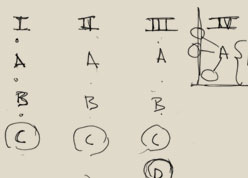Robert Wilson: the CIVIL warS and After
After Einstein at the Met, you said you’d never produce one of your own works again. Do you still . . .
Never again.
At least not until the next time. While I would be surprised if you don’t succeed in getting the CIVIL warS staged sometime in the future, I can’t help feeling that a very real part of work has been lost. With its theme of universal brotherhood, its diverse cultural makeup and international cast, the CIVIL warS was a mirror of the Olympics itself. The occasion of its presentation was really part of its form.
Yeah, it’s true.
I imagine at this point, though, you probably care less about what’s been lost than seeing the work presented in its entirety.
I don’t think it will ever happen. It would all have to be re-rehearsed, which would mean a lot more money and a lot more time. I think it will continue to happen in parts but that’s probably it.2
If you knew at the beginning what you know now, do you think you could have made it happen?
I doubt it.
Given rising costs and lack of subsidy, do you think your works can still be created in this country?
Oh, I think so. Sure.
One of the long-term benefits of the CIVIL warS has been your ongoing collaboration and friendship with the East German playwright Heiner Müller. How did this seemingly unlikely association come about?
I was about to the Cologne section of the CIVIL warS and I wanted a German writer to create the text. I thought about asking Botho Strauss but Peter Stein told me he didn’t think he would be interested. So Ivan Nagel (Director of the Wurttemberg State Theater in Stuttgart) suggested that I write Heiner, who had seen my work and was interested in it — we had even met briefly when I was in Cologne doing The Man in the Raincoat (1981). So I wrote him a letter and asked if he would like to work on the project and he wrote back saying he was interested. Then Heiner came to see me when I was preparing the first workshop of the CIVIL warS in Rotterdam and we talked about how we’d work. Three or four months later we met in Cologne. He wasn’t around in the beginning so I went ahead and directed without a text. When he arrived he brought various pieces of texts and we’d put them together with what I’d done. In the beginning, it didn’t work at all. But he kept looking at what I was doing and putting different texts with it and eventually we would find things that did work. That’s more or less how we collaborated. Sometimes he just wrote texts that he thought might be right, not having an idea what the staging might be, and I’d go out and stage the scene, not knowing what the text would be. Then we’d put the two together.
Tell me about the texts he brought in.
Mostly, he took texts he had already written or found in other sources. He also wrote some texts on his own, but Heiner writes very slowly — he’s spent some twenty or thirty years on his Medea plays. It was a very interesting collaboration. I’ve never had texts that dealt with stories like his before, his writing is very visual. Heiner’s texts are also very hot emotionally but I presented them in a cooler way with a greater distance and formality, like in all my work. His plays are becoming very popular in Germany now and they always take the hot text and present it in a very hot way. I think that’s a mistake. Doing it in a cooler way gives you more space and perspective. I also think to be hot on stage you’ve got to be cold. When you’ve got a hot text and you want it to be really hot, you have to be very cold. If you perform it in a hot way, what you’re going to get is . . . nothing.
2 A more optimistic Wilson is currently negotiating to present the CIVIL warS in Austin, Texas in 1986 as part of that state’s sesquicentennial celebrations.
